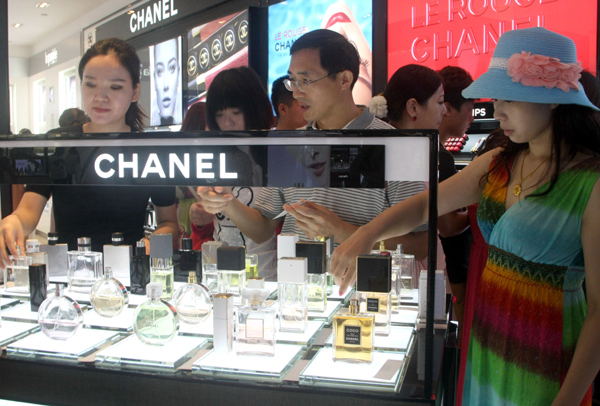Luxury goods' prices rising in the mainland
Updated: 2013-01-15 01:45
By SHI JING in Shanghai (China Daily)
|
||||||||
Shoppers who think the prices of luxury goods in the Chinese mainland market are already too high should prepare themselves for a shock.
 |
|
Customers at a duty-free shop in Sanya, Hainan province. Chanel China said the prices of some of its products sold on the mainland will be raised on Tuesday or Wednesday. Sun Qing / For China Daily |
Sellers of many luxury brands are jacking up the prices of their products in what is likely to be only the first round of such increases in 2013.
Retail analysts said foreign sellers are trying to make up for a decrease in sales in other markets, especially Europe, by trying to take advantage of the current strong demand in the Chinese mainland for luxury items.
Benefit Cosmetics, a cosmetics manufacturer, was the first to start the trend, raising the prices of its popular products on Dec 29.
Various beauty products sold under the SK-II brand soon followed. The brand's essence lotion, for instance, became 4.7 percent more expensive. Meanwhile, luxury goods companies including Christian Dior SA and Chanel SA are also known to be preparing to raise their prices.
Christian Dior has not provided an official response to inquiries about a possible price increase.
But Qiu Huiping, a Christian Dior beauty consultant at the Pacific Department Store in Shanghai, said the price of all makeup, skin care products and perfumes will increase by up to 30 percent in January in the mainland market, adding that no specific day for when the policy will go into effect has been confirmed.
Cai Like, a Chanel sales representative at the same department store, said the price of cosmetics and cologne for men will also soon go up.
Chanel China later said the prices of some of its products sold on the Chinese mainland will be raised on Tuesday or Wednesday, saying there will be "a slight increase of up to 10 yuan ($1.60) for only a few products".
"The price adjustment this time is based on regular checks of our products," a Chanel China spokesman said. "It is also a result of rising labor costs, raw materials and operating costs combined with exchange rate fluctuations."
The official explanation of why the prices of luxury products are ever increasing only scratches the surface of the real reasons. One important point to keep in mind is that sellers are trying to take advantage of the buoyant demand for luxury products that exists in the mainland market, said Zhou Ting, head of the Fortune Character Institute, a professional institute that specializes in studying how the rich live.
"Despite there being an ever-increasing craving for luxury products in China, brands are raising their prices anyway in the hope of introducing an imbalance between supply and demand," she said. "For one thing, brands can burnish their images by introducing limited editions of their products. For another, the profit margins of these products will be pushed to a maximum, although profit margins in China are already greater than in any other countries or regions."
Zhou further explained that the compound annual growth rate for sales of luxury cosmetics has been negative for five consecutive years in the Chinese market, a consequence in part of Chinese consumers being less loyal to particular brands.
China's largest fashion and lifestyle publisher, Trends Media Group, recently released a report on fashion consumption and industry developments, using an annual survey conducted in 20 Chinese cities as its data source.
It suggested that between 30 and 40 percent of Chinese consumers exhibit loyalty to brands in the five main categories of luxury goods — clothing, automobiles, jewelry, watches, and cosmetics and perfume.
Zhou said Chinese consumers tend to choose brands that are sold at a discount, a predilection that is especially common among ordinary consumers.
"Meanwhile, luxury brands have been making price adjustments more often ever since last year, which is quite irregular," she said. "In the long term, brands will lose consumers."
Zhu Lingqing contributed to this story.
Contact the writer at shijing@chinadaily.com.cn

 Li Na on Time cover, makes influential 100 list
Li Na on Time cover, makes influential 100 list
 FBI releases photos of 2 Boston bombings suspects
FBI releases photos of 2 Boston bombings suspects
 World's wackiest hairstyles
World's wackiest hairstyles
 Sandstorms strike Northwest China
Sandstorms strike Northwest China
 Never-seen photos of Madonna on display
Never-seen photos of Madonna on display
 H7N9 outbreak linked to waterfowl migration
H7N9 outbreak linked to waterfowl migration
 Dozens feared dead in Texas plant blast
Dozens feared dead in Texas plant blast
 Venezuelan court rules out manual votes counting
Venezuelan court rules out manual votes counting
Most Viewed
Editor's Picks

|

|

|

|

|

|
Today's Top News
Boston bombing suspect reported cornered on boat
7.0-magnitude quake hits Sichuan
Cross-talk artist helps to spread the word
'Green' awareness levels drop in Beijing
Palace Museum spruces up
First couple on Time's list of most influential
H7N9 flu transmission studied
Trading channels 'need to broaden'
US Weekly

|

|







